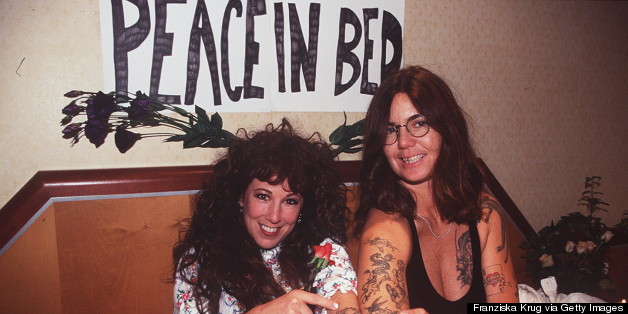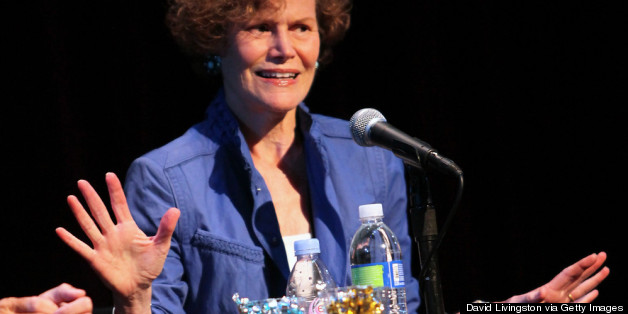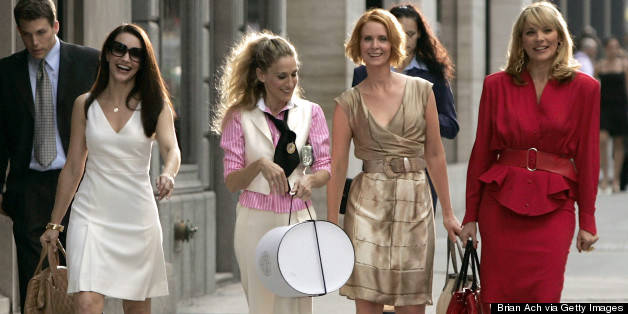
When it comes to women and sex -- the having of it (and not), how it's perceived (or ignored) -- things are never, ever simple. The history of female sexuality in the United States is full of repressors and revolutionaries. In honor of Women's History Month, we're paying homage to the latter -- women who, in ways both big and small, have somehow changed the conversation around sex, sexuality and reproductive health.
But first, a few caveats: For this list, we're sticking with figures whose influence we've had at least some time to measure. So the Beyonce of 2013, with her crooning about oral sex and general gloriousness, is out -- as are people like Lena Dunham, Jincey Lumpkin and Sasha Grey. They're game-changers for sure, but still changing the game in ways we can't yet fully wrap our brains around. Second (and, you know this, of course), our list is in no way exhaustive. Be sure to let us know who we missed in the comments below.
Oh, and happy Women's History Month, y'all!
THE HEALTH MAVERICKS:
'Hysterical' Victorian Ladies
The Victorian years were some dark, dark times in the history of sex. Masturbation was evil and everyone was on edge about licentiousness. It was also the heyday of one of the most dubious medical diagnoses ever -- hysteria, a catch-all for ladies who had mood swings and sexual desires (the horror!). But proving that good can emerge from absurdity, those women were the catalyst for the creation of the vibrator -- a tool invented to "cure" this so-called hysteria by bringing about hysterical paroxysms, aka, orgasms.
Margaret Sanger

Born in 1879, Sanger is the godmother of birth control (she coined the term), and a woman who fundamentally altered the course of reproductive health. She was inspired to action after watching her own mother die young, weakened by the strain of having 11 children and seven miscarriages. Sanger started the first-ever medical journal focused on contraception and Planned Parenthood -- which 1 out of every 5 women in the U.S. has now used for reproductive health services at some point.
Katherine McCormick
The other godmother of birth control (and the second woman ever to graduate from MIT), McCormick "provided almost every single dollar necessary to develop the oral contraceptive," reports PBS, at a time when big pharma could not have been less interested in investing. McCormick's willingness to throw her financial weight behind something that was hugely controversial (PBS points out that 30 states had laws against the use of contraceptives at the time), made her a total badass. "I still feel, as I have felt from the first, that there is nothing more important than birth control," she wrote in a letter to Sanger in 1948, PBS reports.
Virginia Johnson
As half of the team Masters and Johnson, this one-time secretary turned researcher transformed our understanding of female sexuality in study after study, from the 1950s onward. Among other things, Johnson helped debunk Freud's assertion that vaginal orgasms were somehow superior to clitoral ones, and showed that women are capable of climaxing multiple times with no break in between.
The Boston Women's Health Collective
In 1969, 12 women met at a conference in Boston and swapped stories about their past experiences with doctors, as well as their own bodily know-how. The get-together proved so fruitful that one year later, those women (who would soon become known as The Boston Women's Health Collective), issued a 193-page booklet called "Women and Their Bodies," (which would soon became known as "Our Bodies, Ourselves," a bestseller and the bible for information on women's health and sexuality for many generations).
Ina May Gaskin

Perhaps the most famous midwife ever, Gaskin (and her "Farm" in rural Tennessee) have a cult-like following among women seeking natural, home births. But Gaskin is on this list for her vocal (and not un-controversial) insistence that childbirth is inherently sexual -- that it can, in fact, be "orgasmic," full of emotions, ecstasy and relief. "It's not a guarantee," Gaskin once told the Associated Press, "but it's a possibility."
Francoise Barre-Sinoussi
In 2008, the French virologist won a Nobel Prize for her part in co-discovering the human immunodeficiency virus (a.k.a HIV) -- a breakthrough that has been absolutely crucial to the development of life-prolonging drugs and diagnostic tools that have helped make sex safer for everyone. She's also remarkably modest about her accomplishments, telling The Guardian: "I never felt that I received the Nobel prize personally. It was really a Nobel prize for the whole community."
THE EDUCATORS:
Dr. Ruth
Ruth Westheimer is the sex-savvy grandma we all wish we had, a true pioneer who has been writing and talking about sex on her syndicated radio show for decades. She's also something of a renaissance woman who recently put out her own low-alcohol wine: "Drink a little because everybody has stress [but] don’t drink too much," she told The Washington Post. "She falls asleep and he can't have an erection." Wisdom!
Sue Johanson
A registered nurse, author and TV and radio personality, Johanson's "Sunday Night Sex Show" and "Talk Sex With Sue Johanson" provided much-needed opportunities for people to hear straight talk about sex, gleefully delivered, and to ask questions in an embarrassment-free zone. "I started because I ran a birth control clinic for kids and realized these kids hadn't a clue what they were doing, so I decided I better teach it," she once told The Gauntlet, a Canadian publication.
Annie Sprinkle

A self-proclaimed "artist, sexologist, ecosexual, author, lecturer, educator and thespian" (not to mention, according to her website, the first former prostitute and porn star to have earned a Ph.D.), Sprinkle has been pushing sexual boundaries for decades. In the mid 90s, for example, she got on stage and invited audiences to study her cervix through a speculum. She was also a very public player on the sex-positive feminism scene in the 1980s. "I've shown my cervix to about 40,000 people over the years," she once told A.V. Club. "People told me it helped them relieve some shame," Sprinkle added, "you know, “If she can show her cervix like that, maybe I should take a look at mine.”
THE POP STARS:
Eartha Kitt
As a singer and actress, Kitt was enormously popular in the U.S. and Europe -- "among the first widely-known African American sex symbols," the New York Times wrote upon her death in 2008. She was an unabashed sex kitten (the woman literally purred and growled) and a talented performer who boldly owned her sultry image. As Essence once put it, she "was never afraid to show off her sensuality at a time when black actresses were typecast as caretakers."
Madonna
Trying to sum up the ways in which Madonna -- she of the cult coffee table books, wedding dress-writhing and Evian bottles -- has influenced sex in a few sentences is absurd, but Sara Marcus came close in her 2012 Salon ode to her Madgesty, writing: "Her visionary assault on American prudery, her revelatory spreading of sexual liberation to Middle America, changed this country for the better. And that’s not old news; we’re still living it."
Janet Jackson

For years, Jackson's songs and music videos celebrated sex and sensuality. ("Sex isn't just fire and heat, it's natural beauty," she once told Rolling Stone, adding, "I love feeling deeply sexual -- and don't mind letting the world know.") Add on a nipple slip that forced us to grapple with the definition of "indecency" and confront longstanding stereotypes about black women, and you've got a legit sexual lightning rod.
THE WRITERS AND EDITORS:
Anais Nin
As a novelist and one of the most influential diarists in history, Nin wrote about sex in ways that were both groundbreaking and enthusiastic. "To describe sex that actually happened ... requires even the boldest of writers to stare down the specter of modesty," author Claire Dederer recently wrote in The Atlantic. "If Nin did just a fraction of the things she describes in her diaries, which began appearing almost half a century ago, it would be plenty."
Helen Gurley Brown
Say what you will about Cosmopolitan's particular brand of sex coverage, but Gurley Brown -- the glossy's editor from 1965 to 1997 -- is a legend. She "shocked early-1960s America with the news that unmarried women not only had sex but thoroughly enjoyed it," her New York Times obituary read, and "spent the next three decades telling those women precisely how to enjoy it even more."
Erica Jong
"Fear of Flying" -- and its famous "zipless f***" -- put it out there like few things had before: Women like having sex. Women can find sex empowering. Women fantasize. “I was aware I was committing a rebellious act,” Jong once told The Washington Post. “And I was sure no one would ever read it, no one would publish it.” Wrong on both counts.
Judy Blume

Say Blume's name in a group of women and someone will let-loose an enthusiastic "I LOVE her!" Millions of girls came of age with Blume's books, inhaling her words to learn more (more, more!) about sex, puberty and masturbation. Blume was candid with teens and respectful of their curiosity in a way few people had been before, or have been since. "I’d never heard the word masturbation as a kid. There was a group of friends, and we all talked about whether we had a 'special place,' and it was like, 'Oh you have it too, interesting,'" she said in a 2013 interview with Rookie. "We were reassured that we weren’t the only ones." Her work, she said, aims to tell kids, "this is OK and it is normal."
Audre Lorde
As an activist and poet (and self-described "black, lesbian, mother [and] warrior"), Lorde was unrelenting in her attacks of sexual prejudice and homophobia and insistent that, despite societal pressures discouraging it, women should embrace their eroticism. "Of course, women so empowered are dangerous," she wrote in the book "Black Woman Writers At Work." "So we are taught to separate the erotic from most vital areas of our lives other than sex."
Alice Walker
Walker's seminal, Pullitzer Prize-winning work "The Color Purple," has some of literature's most honest, moving scenes about a loving (and sexual) lesbian relationship. Since its publication in the 1980s, the book has also been the subject of several campaigns to have it banned from various school systems. "The truth is the only guide," she has said of her drive for honesty and inclusion in her writing.
Eve Ensler
The playwright who gave vaginas a voice (The Monologues have been translated into 45 languages and performed in more than 120 countries), Ensler's also a passionate activist who fights violence against women, and an outspoken proponent of women embracing their sexuality. "I would tell [moms] to love their daughters' vaginas, and to really encourage that love," she has said. "If they see their daughter masturbating, never make her feel dirty or bad."
Candace Bushnell

Bushnell's characters have left a Manolo-sized mark on many a girl and woman, whether they got to know Carrie, Samantha, Charlotte and Miranda through the writer's books, or the TV show (though hopefully, not the movies). Bushnell's flawed, emotional protagonists had lots of sex -- good and bad -- and felt no shame about it being an integral, celebrated part of their lives.
CORRECTION: An earlier version of this article incorrectly stated that Freud believed clitoral orgasms to be superior to vaginal orgasms.
